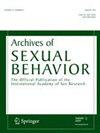正念认知治疗性兴趣/觉醒障碍后,关系因素对性欲和痛苦改善调节作用的初步研究。
IF 2.9
2区 社会学
Q1 PSYCHOLOGY, CLINICAL
引用次数: 0
摘要
正念认知疗法(MBCT)已被证明对性兴趣/觉醒障碍(SIAD)女性改善性欲和减少与性相关的痛苦非常有效。到目前为止,还没有研究过MBCT的疗效在多大程度上受到关系因素的影响,这对根据个人的特殊关系特征向寻求治疗的人推荐MBCT具有重要意义。本研究的目的是检查70名SIAD女性(平均年龄39.3岁)的关系状态、关系持续时间、自我报告的关系亲密度和关系满意度作为MBCT性欲和性困扰结果的调节因子。多水平模型检验了这四种调节因子对治疗后立即、6个月和12个月随访结果的影响。在MBCT后,单身女性、自我报告在情感关系中不亲密的女性和关系满意度得分较低的女性在性欲方面的改善显著更大(d范围从0.49到0.99),这些关系变量对性相关困扰没有影响。多年的恋爱关系并没有缓和这两种结果。这些初步研究结果表明,单身且伴侣关系不满意的女性可能比伴侣关系满意的SIAD女性更能从MBCT中获得性欲的改善。本文章由计算机程序翻译,如有差异,请以英文原文为准。
A Preliminary Investigation Into the Moderating Effects of Relationship Factors on Improvements in Sexual Desire and Distress Following Mindfulness-Based Cognitive Therapy for Sexual Interest/Arousal Disorder.
Mindfulness-based cognitive therapy (MBCT) has been demonstrated to be highly effective for improving sexual desire and reducing sex-related distress among women with sexual interest/arousal disorder (SIAD). The extent to which MBCT efficacy is impacted by relationship factors has not been studied to date and has implications for recommending MBCT to individual treatment seekers based upon their particular relationship characteristics. The goal of this study was to examine relationship status, relationship duration, self-reported relationship closeness, and relationship satisfaction as moderators of MBCT outcomes on sexual desire and sexual distress in 70 women with SIAD (Mean age 39.3 years). Multilevel modeling examined the effects of these four moderators on outcomes at immediate posttreatment, and 6- and 12-month follow-up. Women who were single, those who self-reported not being emotionally close in their relationship, and those who had lower relationship satisfaction scores had significantly greater improvements in sexual desire after MBCT (d ranging from 0.49 to 0.99), and there was no effect of these relationship variables on sex-related distress. Years in relationship did not moderate either outcome. These preliminary findings suggest that single and relationally dissatisfied partnered women may benefit more from MBCT in terms of improvements to sexual desire compared to partnered and relationally satisfied women with SIAD.
求助全文
通过发布文献求助,成功后即可免费获取论文全文。
去求助
来源期刊

Archives of Sexual Behavior
Multiple-
CiteScore
5.60
自引率
13.20%
发文量
299
期刊介绍:
The official publication of the International Academy of Sex Research, the journal is dedicated to the dissemination of information in the field of sexual science, broadly defined. Contributions consist of empirical research (both quantitative and qualitative), theoretical reviews and essays, clinical case reports, letters to the editor, and book reviews.
 求助内容:
求助内容: 应助结果提醒方式:
应助结果提醒方式:


